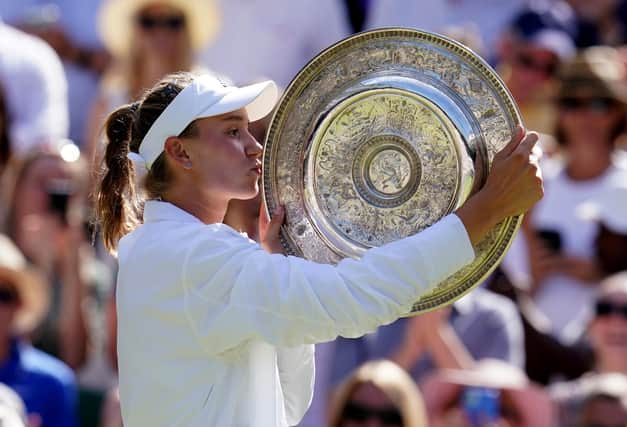Wimbledon 2022: Was this the most awkward and self-conscious triumph in Wimbledon history?


Ons Jabeur is totally Tunisian. That could have been her slogan as she moved around the All England Club this past fortnight, enthusing with pride and passion about the dream of a maiden title for Africa and what it would mean to Arabs everywhere.
But the flair, fun and charm of the world No2 was squashed by the sheer power of Rybakina whose serves and thundering winners drew astonished gasps from the crowd.
Advertisement
Hide AdAdvertisement
Hide AdAfter the victory by 3-6, 6-2, 6-2, and after the players had greeted each other at the net, the 23-year-old went back onto the court. This is usually a moment of wild rejoicing; not yesterday. The majority of Centre wanted Jabeur to win but that can’t have explained Rybakina’s reticence. The championships have had awkward moments for her with numerous questions about her switch of allegiance, which happened long before the war in Ukraine precluding her compatriots from being here and had been entirely down to Kazakhstan offering to help further her career.
There was some awkwardness for the All England Club who can’t have anticipated royalty - the Duchess of Cambridge in a dress of tennis ball-yellow - having to hand the trophy to a Russia-born victor. To be fair to her, she warmed up right after the ceremony, was generous in her praise of Jabeur and cracked some unintentional jokes.
In her media conference Rybakina tried to explain her lack of celebration. She’d been “super-nervous” beforehand and then there was the extra focus needed after falling behind. “It was such a tough match and in the end I just didn’t believe I’d made it,” she said. “Unexpectable,” she called the moment of triumph, admitting: “I’m not going to lie to you, I was too stressed out to enjoy it. I didn’t know what to do - it was too shocking. Maybe one day you see a huge reaction from me - unfortunately not today.”
There were more questions about Russia. Did she think the land of her birth would “politicise” her win? “I don’t know - I can’t do anything about this.” Did she condemn the war and Vladimir Putin? First she said she didn’t understand the question, then: “I’m representing Kazakhstan. I didn’t choose where I was born.” Then, mentioning her parents, came tears. “You have some emotion now,” she said.
The final threw up some terrific moments. Jabeur, having won the toss, elected to begin by receiving these missiles. A couple ricocheted off her racket but, ferreting around, she found some scraps, especially when Rybakina missed with the first delivery.
She’d have been pleased, too, with her own serve, though anything which didn’t make her towering opponent stoop to ankle-height was liable to be thrashed right back at her. But the 27-year-old Jabeur, slicing superbly, broke first after luring Rybankina into a false sense of security, based on the latter’s extreme velocity. A yelp of delight was greeted with great roars.
Jabeur held serve and threatened Rybakina again with delicious volleying. Her opponent persisted with power and overhit. Jabeur was enjoying herself, finishing her effort to reach a ball which was always beyond her with a starfish-shaped leap, and then she broke again.
Their demeanours told the story of the match, at least in the beginning. Jabeur was highly expressive, Rybakina tight-shouldered, and another break brought the unofficial Tunisian ambassador the first set.
Advertisement
Hide AdAdvertisement
Hide AdRybakina’s booming hits landing a foot or more beyond the baseline was shaping up to be the match’s motif but then, almost out of nowhere, she had her first break opportunity and took it. Jabeur tried to respond right away, got done for power and in her frustration threw herself at a stray ball for an impressive header, straight into the ballboy’s arms.
Then came a tweener. If there were points for personality she’d have had the final wrapped up. But back to the serious stuff: Jabeur needed to hold her serve. A peach of a volley set her up, but Rybakina showed she could be delicate and deft when required.
In the fourth game Jabeur sniffed another chance but break-point disappeared in the dust kicked up by another Rybakina rocket. This seemed like the pivotal game. Rybakina had eased into a dangerous rhythm. They borrowed each other’s clothes, Jabeur matching Rybakina’s thump and the latter replicating more of the former’s touch around the net. It was an absorbing contest and more and more it was looking like Rybakina’s.
She opened the final set to love and Hawkeye ruling by a whisker put the serving Jabeur in trouble before a volley out of the latter’s stylebook gave Rybakina a break. Could Jabeur counter? A big chance went astray with a lob which, earlier in the match, she could have dropped her bandana onto her eyes and converted.
Her head was down, she was trudging, the skipping had gone. The crowd tried to lift her, especially when she got to love-40 on Ryakina’s serve, but the eventual winner remained icy calm, staying that way for Jabeur’s despairing last hit and the moment the prize was hers.
Charming to the end, having given the match her all, Jabeur said: “I told myself, I trust you. I even said I love you. It just wasn’t to be.” Then she added: “But I need to teach Elena how to celebrate.”
Comments
Want to join the conversation? Please or to comment on this article.